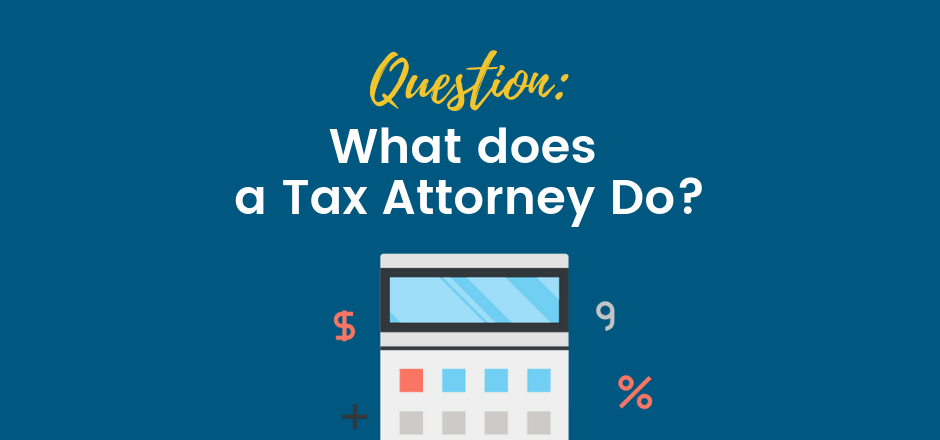What Does a Tax Attorney Do?
Whether you’re starting a business or you anticipate having a taxable estate when you die, a tax attorney can help you navigate the complex and technical field of tax law.
So, what does a tax attorney do?

What does a Tax Attorney Do?
Are you having a dispute with your local municipality? Not sure if your certified public accountant (CPA) is experienced enough to represent you in front of the Internal Revenue Service (IRS)? Maybe you have a complicated tax situation that needs a specialized eye familiar with the intricacies of tax law.
It may be time to move on from your accountant and partner with a tax attorney instead.
Certified Public Accountant (CPA) vs Tax Attorney
A CPA is an individual trained in managing money and finances from a more holistic perspective. They’re an excellent choice if you have a relatively unusual tax situation to consider, such as being a business owner, being married/divorced with children, or having a significant amount of investments to protect.
CPAs are highly educated. They complete five-year degrees in business, pass a major certification exam, and must complete 120 continuing education hours in each three-year period. Knowledgeable CPAs know exactly how to minimize your liabilities while making sure you are following the letter of the law.
A tax attorney, on the other hand, has an official degree in tax-related finances. They must pass the bar exam for their state of residence before they can practice law.
While a tax attorney can prepare a tax return, they are more familiar with the legalities associated with state and federal taxes or the IRS. A tax attorney is more prepared to help you deal with unpaid back taxes, fraud allegations, or tax issues involved with settling estates.
Tax Attorney Specialties
Not every tax problem has to do with fraud, avoidance, or unpaid back taxes. You may need to hire an attorney to help you with a litany of tax-related situations.
A tax attorney can help you in these situations:
- When you must plan your estate in a way that minimizes taxes, such as if your estate surpasses the minimum threshold for taxation.
- If you owe taxes to the IRS and would like an independent review of your situation in tax court.
- If you want to file a lawsuit against the IRS.
- If you are being criminally investigated for tax fraud or evasion.
- When you want to start a business and need to better understand the tax ramifications associated with different entity structures.
- If you want to expand your business on a global level and need help with international taxes and contracts.
- When you owe a major tax debt to the IRS, especially when you want to settle or compromise.
- When the IRS is attempting to levy your accounts or garnish your wages.
- If you find yourself struggling to navigate complicated and confusing tax forms and documents.
- If you need help to legally minimize your tax obligations and liabilities in the future.
Related: What Happens if You Don’t File Your Taxes?
Why You Should Hire a Tax Attorney
Aside from the ability to represent you in court, there is another major reason to consider a tax attorney over a CPA when dealing with the IRS. While a breach of confidentiality would certainly reflect poorly on a CPA and possibly be a breach of ethics, lawyers are bound by client-attorney confidentiality rules. You can feel comfortable spilling all of the nitty-gritty details associated with your situation so that your attorney can get a full-picture idea of where you’re coming from, how your problems formed, and how they might have to act to help you solve your issues.
Your CPA, no matter how trustworthy, does not have the same legal protection. This means they can be forced to testify against you in court.
Another very important factor to consider when hiring a tax attorney is time. IRS tax law code fills almost 2,000 pages of legalese, but tax attorneys and their paralegals are very familiar with each section of code. They’ll be able to quickly sort through the mess to figure out what applies to your situation. They’re also experienced at keeping up with changes to the laws themselves, in addition to how the IRS interprets them.
Tax Resolution Scams
Unfortunately, it’s pretty common for tax resolution companies to claim they have attorneys on staff when they actually don’t. The only way to avoid this situation is to ask for the attorney’s name and bar number.
For the best results, consider contacting an attorney referral service in your area. They will help you find the best attorney for your needs.
You should also avoid any tax resolution company that promises a specific result. While they may be familiar with common outcomes, no one can force the IRS to do anything on your behalf, especially without knowing all of the details of your situation.
Related: San Fernando Valley Attorney Referral Service
How to Choose a Tax Attorney
Finding yourself in a situation where you need to move on from a CPA to a tax attorney can be stressful, whether it’s because you’re growing your business or are having a personal tax problem. There are several things you should consider as you assess your options.
- As noted, make sure you are talking to an actual attorney’s office and not just a tax resolution office. Many misrepresent themselves.
- Does the attorney in question offer a free consultation? Can you speak to them face-to-face before making a decision?
- Does the attorney have any complaints filed against them?
- Find out who will be handling your case – the attorney or an assistant. Determine how comfortable you are with this level of care.
- Do other business owners recommend the attorney you are considering?
- Does the attorney have experience with your specific industry?
- What is the attorney’s fee structure? How often are fees collected?
- What is the attorney’s success rate when dealing with IRS issues?
Conclusion
Now that you know what does a tax attorney does, you can consider whether or not hiring one is right for you.
Tax troubles are stressful. Working with an experienced tax attorney can ease some of the pressure and ensure your problems are handled quickly and efficiently. As an individual with tax problems, you’ll feel more comfortable dealing with the IRS. As a business owner, you’ll feel more secure in the direction your business is taking.
Don’t be afraid to interview as many tax attorneys as you feel necessary before making your choice. You need to feel as though you’re working with someone you can trust.
Are you in search for a certified attorney to represent you?
Let us help you find one today!



